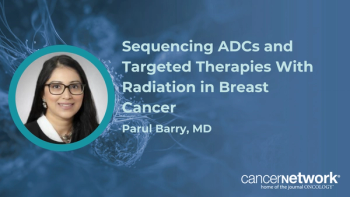
- ONCOLOGY Vol 22 No 6
- Volume 22
- Issue 6
Variants of Vitamin D Receptor Linked to Increased Risk of Developing Breast Cancer
Genetic variations in the body’s receptor for vitamin D could increase the risk of breast cancer in postmenopausal women, according to a study published in the journal Breast Cancer Research.
Genetic variations in the body’s receptor for vitamin D could increase the risk of breast cancer in postmenopausal women, according to a study published in the journal Breast Cancer Research. Jenny Chang-Claude, MD, of the division of cancer epidemiology at the German Cancer Research Center in Heidelberg, and colleagues there and at the Institute for Medical Biometrics and Epidemiology, University Clinic Hamburg-Eppendorf, Germany, undertook a population-based case-control study involving 1,408 patients and 2,612 control individuals.
Estrogen Metabolism Involvement
The researchers explained that vitamin D intake and serum concentrations of its metabolites have been associated with a decreased risk of developing breast cancer. The vitamin plays a known role in controlling calcium levels and influences the differentiation of cells and so could play a part in preventing the runaway proliferation of cells characteristic with cancer. Previous investigations regarding the association between vitamin D and breast cancer have been inconsistent in their conclusions.
Chang-Claude and her colleagues have investigated variations in the gene encoding the vitamin D receptor protein. They found that there were no differences in the biomarker for vitamin D, 25-hydroxyvitamin D, between women with two well-known genetic variations, the polymorphisms Fok1 and Taq1, and two functional putative variants, VDR-5132 and Cdx2, in the gene for the receptor. Moreover, they found no relationship between the presence of these polymorphisms and overall risk of postmenopausal breast cancer.
However, they found a significant increase in the risk of estrogen receptor–positive tumors among women with the Taq1 genetic variant. This suggests the involvement of estrogen metabolism in the anticancer activity of vitamin D.
“Further studies focusing on the influence of genetic variations on vitamin D receptor functionality, activity, and concentration are now needed” said Chang-Claude.
Articles in this issue
almost 18 years ago
Professionalism and Cancer Carealmost 18 years ago
Martin Abeloff and the Quality-of-Life Movementalmost 18 years ago
Tracking 35 Years of Progress Against Breast Canceralmost 18 years ago
Remembering Martin D. Abeloff, MDalmost 18 years ago
Psychological and Social Aspects of Breast Canceralmost 18 years ago
The Importance of Communication in Treating Women With Breast Canceralmost 18 years ago
Making Strides in Adjuvant Therapy for Breast CancerNewsletter
Stay up to date on recent advances in the multidisciplinary approach to cancer.







































